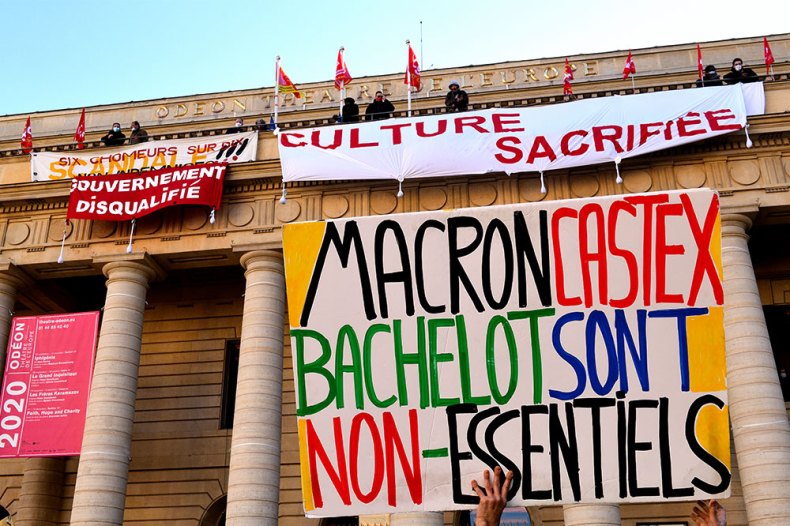In her memoir recounting the 682 days that she spent as French culture minister, Roselyne Bachelot is not worried about burning bridges. Her career in politics, as the 76 year old reminds us in the opening pages, was over before Emmanuel Macron asked her to join his government in 2019. It was only the draw of the one job that Bachelot, a classical music enthusiast and lover of the arts in general, still wanted to do that made her return. Now that she has stepped down, she has no further ambitions and nothing to prove. Subtitled The Hypocrites’ Ball, referring to the many back-stabbing and two-faced characters she met during her time in office, Bachelot’s book calls out spoilt artists – who have the temerity to strike when the subsidy system is already generous – as well as various local and national government employees, happy to wine and dine together discussing big ideas, but failing to put their words into action. What Bachelot does not provide, however, is a real analysis of the problems she found at the rue de Valois or those she has left behind for her successor Rima Abdul Malak.
682 jours is a pit-bull of a book, with its author on the attack, but it is also has a defensive air as Bachelot seeks to justify her time in office during a period defined by the Covid pandemic. She also exonerates herself from a degree of responsibility because, as she makes clear from the start, her hands were tied due to the bigger problems besetting the ministry. In the public imagination it remains a venerable institution with the figures of André Malraux (its first occupant) and Jack Lang (its most effective) looming large. But forget that, Bachelot tells us, we live in a brave new world. ‘What is obvious,’ she says, recalling her first impressions, ‘is that I am at the head of a dismembered ministry, crippled by cronyism, moving like a checkout counter handing out subsidies’.
A key problem is the rapid changeover of ministers – there have been 23 since 1959, with Malraux and Lang each holding the post for a decade. This rhythm makes it difficult for a minister to have any lasting effect, she says, worrying that the game of ministerial musical chairs has turned France into a laughing stock internationally (though it is perhaps more amusing that she imagines other countries take any notice at all). Bachelot struggles to remember half the names of her predecessors, she says. Added to this is an absence of real power and a critical lack of funding (Anglophone readers may find it hard to relate). ‘It was clear that the plan was to fleece the ministry,’ Bachelot says after attending her first meetings. When she gets wind of her budget she immediately pens a letter to the prime minister Jean Castex. A few hours later, he responds with, ‘You have your 2 billion!, and the only pity is that this turns out to be the high point of her 682 days.
Protest at the Theatre de l‘Odéon in Paris, calling for cultural venues to be reopened, in May 2021. Photo: BERTRAND GUAY/AFP via Getty Images

There is a breathless quality to the book, with many phrases rounded off by an exclamation mark. Bachelot describes herself as always rushing to catch a train, attend an event, read a pile-up of dossiers on her desk, saying ‘sleep will come later’. The frenetic pace is no doubt broadly accurate, but its reproduction in prose is characteristic of the book’s shortcomings. Written so soon after her tenure, there is no critical distance between the description of what she did and any reflection on the merits, or otherwise, of these actions – nor on why she inherited such a castrated ministry in the first place. Her account of the face-off against the artists who went on strike during the pandemic is typical of her approach. For several weeks, crowds camped outside the Théatre de l’Odéon, in an episode Bachelot recaps quite wittily, but without stepping-back to consider the subsidy system in France more broadly and how funds are often allocated not to those most deserving, just the ones best at filling in the right forms. Bachelot instead lobs one of her many insults, in this case at the prolific singer and actor Benjamin Biolay (who, it has to be said, is a deserving target.
While Franck (Riester, Bachelot’s predecessor) and I fight to preserve the French cultural exception costing billions and with its sophisticated measures, we are challenged and attacked by the richest artists, such as Benjamin Biolay… throwing in my face in the middle of a show: ‘You put me on a diet of dry toast!’ Well as far as his toast goes, it was well buttered on both sides.
‘Non-essential’ was the now infamous term used by Macron in his address to the nation announcing the first shutdown in March 2020 in whih all ‘non-essential’ work and venues were to close, including all those in the cultural sector. The use of the term and the fact that she stood by it still haunts Bachelot long after her 682 days and the writing of this book. The reaction was terrible and much of it directed at her.
Opening a book, non-essential
Sincere smile, non-essential
Going to concerts, non-essential
Taking a walk in the forest, non-essential
Dancing at a party, non-essential
Meeting with friends, non-essential
Live theatre, non-essential
So went ‘Non-essential’, a song by Grand Corps Malade that became a popular anthem during the first shutdown. It is to her credit that Bachelot cites these lyrics and apologises for not calling out the term as clumsy and misleading at the time.
President Emmanuel Macron, Benin’s President Patrice Talon, French culture Roselyne Bachelot and Benin’s tourism Minister Jean-Michel Abimbola at the signing of an agreement about the return of looted cultural artefacts at the Elysee Palace on 9 November 2021. Photo: Sarah Meyssonnier/AFP/POOL/Getty Images

Bachelot dedicates a few brief passages to the question of restitution. Macron’s speech in Ouagadougou in 2017, in which he pledged to make restitution a ‘top priority’, was celebrated, but also mocked for being yet another example of grandstanding without a roadmap. And while France has since pulled its last troops from Mali in 2022 after a decade-long and ultimately disastrous military intervention, it has been less proactive about restitution to African countries compared to other states in Europe. Bachelot detected a worm in the apple at once, when Macron followed up his speech by encouraging the creation of the ‘pompously baptised’ National Council for Reflection on the Circulation and Return of European Cultural Property. She describes its value as
difficult to see in relation to the existing structures, as the study of works requires experienced specialists. Finally, as usual, France will sacrifice this for its penchant for setting up committees that are quick to produce reports, recommendations and white papers that nobody cares about. This will allow a few lazybones to find a reason to live and a few requisitioned civil servants to draw up the verbose minutes of these meetings to justify their remuneration. Now, I’m getting angry…
With her blood boiling, as it often does, Bachelot moves on. So, as with the other subjects in her book, we do not dig deeper. Anecdote and opinion take the place of a more thoughtful discussion of France’s sadly diminished ministry of culture.
682 jours by Roselyne Bachelot is published by Plon.



